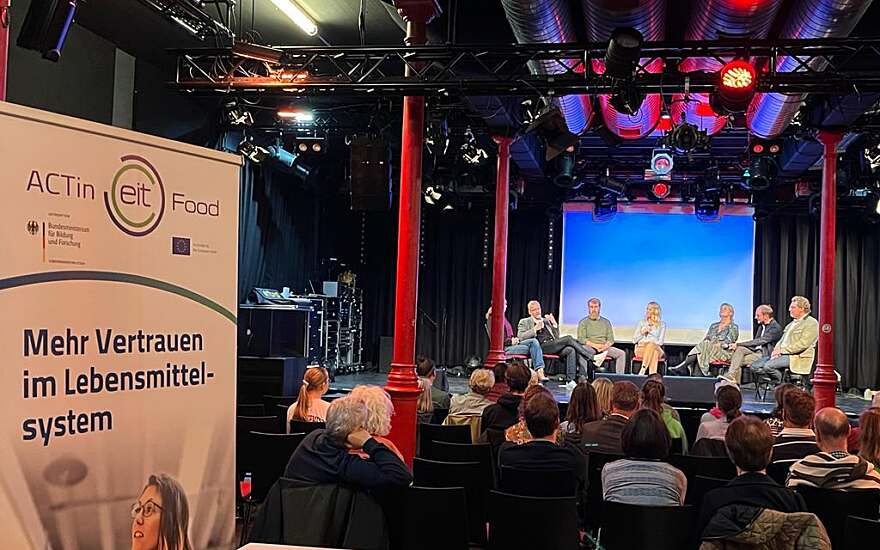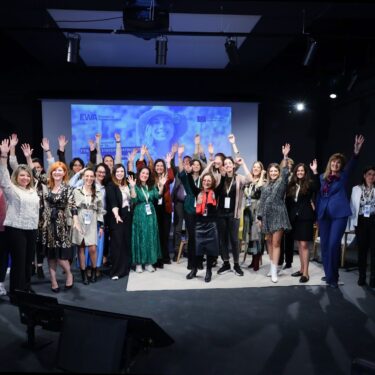The figures are more than frightening: the potential for avoiding food waste in Bavaria alone is an unbelievable 1.31 million tons per year - the equivalent of 73,000 fully loaded lorries! How can consumers help to actively prevent food waste? That was the question at the 2nd Freising Food Dialogue in Germany as part of the events for the sustainability exhibition "Ways to the Future".
"Smelling and tasting is still the best way to prevent food waste," explained bestselling author Katarina Schickling on the podium in the Bavarian town of Freising. "My grandma always did it that way, long before there was a so-called "best before" date on the packaging" Schickling said. Because that was the biggest problem, she said, since "most food has a much longer shelf life!" University lecturer Manuela Gassner also supported this view at the panel discussion organized by community college Freising and ACTinEITFood, Europe's largest innovation network for a healthy and sustainable food system in cooperation with the German Federal Ministry of Research and Education: "In England, it also makes much more sense to say, 'better before”, instead of the too long German version here on the products, so it doesn't automatically goes bad afterwards."
"We have to explain this much more and in addition educate much more the labels like the Nutri Score on the packaging, so that consumers can really make decisions for healthy food and the actual shelf life is always longer," explains nutritional physician Professor Thomas Skurk from the Technical University of Munich on this. Often, the best-before date is completely confused with the indication "to be consumed by", which, however, is rightly found on easily perishable foods such as minced meat.
But is it only the consumer who destroys food, asks presenter Eva Walig (München TV), because even crooked cucumbers are sorted out in the field so that the trade does not accept them in the first place? "Cucumbers should be stackable," Katarina Schickling agreed. The trade wants this for practical reasons, but it has nothing to do with the quality of the cucumber, said farmer Georg Schmied, deputy district chairman of the Bavarian Farmers' Association in Freising. He also confirmed that the trade always prefers shiny apples that have been sprayed several times in the shops. The "normal" apple with small spots or a little scab is not desired but "it tastes just as good and is healthier". But it is above all the consumers who can counteract this with his or her purchasing behavior.
"There is no single culprit for food waste, the entire system must be reformed"
"There is no single culprit for food waste, the entire system must be reformed," said Dr Georg Schirrmacher Innovation Network EIT Food, which has its office for Germany in Freising. He looked towards France, where the legislator has already stipulated that food retailers are no longer allowed to destroy food. This has made it possible to set up an aid organization for the needy comparable to the "Tafel", which did not exist before. Also, more food is now saved in France via the mobile phone app "Too good to go" than in the whole of the rest of Europe put together. However, Schirrmacher also saw many positive things already realized: start-ups that can curb the overproduction of bakeries with new software by tracking the actual sales of the branches more precisely. Or, with the help of artificial intelligence, count how much leftover food large canteens later find on the returned tablets per meal serving, in order to cook the real food demand even more precisely the next time."
TV presenter Eva Walig wanted to hear concrete tips against food waste from the panelists at the end of the panel discussion: "Buy the individual bananas in the supermarket, because they are always left over and then thrown away in the evening," Katarina Schickling explained. "An accurate shopping list helps a lot against food waste later on," said Manuela Gassner. And: "Too good for the bin", she said, was the best and most recognized internet platform in Germany with lots more advice on the subject. And the app "Too good to go" in Europe.
"Old bread is the most versatile food: you can even use it to brew beer," said Lukas Stanzl from Coffee-shop “Café Übrig” (so called Café Left over). By the way, if you go there in Freising, you are only served saved food and as a guest you only pay for drinks. Stanzl: "We also want to talk to many people who don't know much about food waste and educate them further." And: especially at buffets, there is always food left over. Schickling says: "You'd better avoid all-inclusive holidays with buffets, because most of the food is automatically destroyed!"
In the end, everyone agreed that the value of food should be better communicated to primary school children, and that cooking should be part of the curriculum so that food does not end up in the bin too quickly. And even a crooked cucumber certainly makes a delicious cucumber salad, just as "an unsprayed apple is much healthier than its highly polished counterparts," Schmid said.
Frank Horlbeck
More News from EIT Food West








